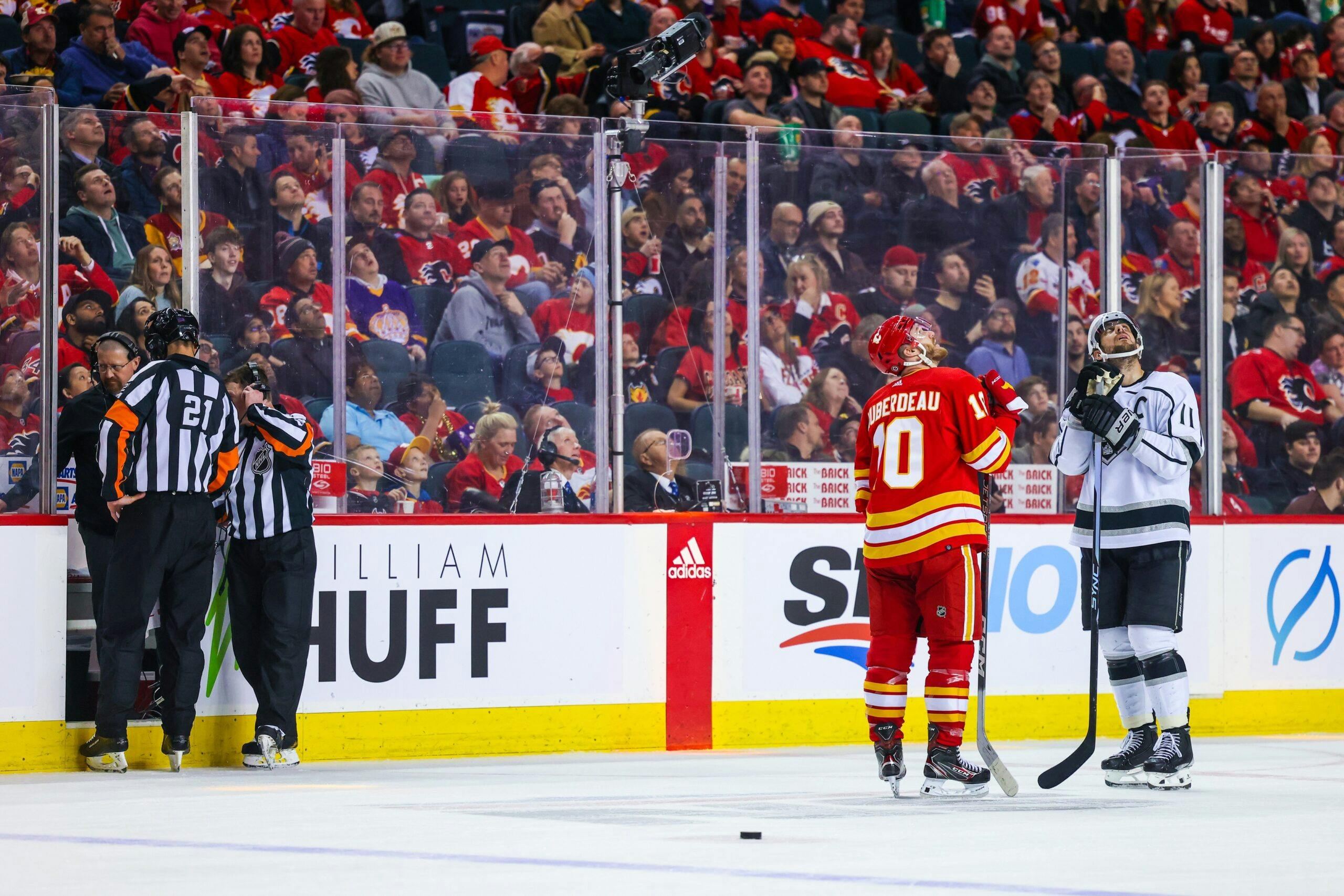Nation Sites
The Nation Network
FlamesNation has no direct affiliation to the Calgary Flames, Calgary Sports and Entertainment, NHL, or NHLPA
The Calgary Flames’ playoff elimination was death by a thousand tiny cuts

Photo credit: Sergei Belski-USA TODAY Sports
The Calgary Flames were mathematically eliminated from qualification for the Stanley Cup playoffs on Monday night, a product of a 3-2 shootout loss to the Nashville Predators. But broadly speaking, the loss to the Predators didn’t cause the club to miss the post-season, it was merely the last straw in a season that was derailed by many small errors.
The Flames’ playoff elimination was the product of death by a thousand tiny cuts.
The Nashville loss was fairly representative of the entire season:
- The Flames out-shot Nashville 44-29, including 32-20 at even strength.
- The Flames’ goals against were products of (1) a puck-handling miscue by goaltender Jacob Markstrom and (2) a puck that bounced off referee Chris Rooney behind the net and bounced out to Zach Sanford.
- The Flames never had a lead during the duration of the game.
- The Flames produced zero goals and just two high-danger chances in 7:30 of power play time.
- The Flames had looks in overtime and could not score on them – Natural Stat Trick had high-danger chances at 2-0 for Calgary in extra time.
- The Flames only scored once in four shootout opportunities.
If you want to argue “Hey, the Flames missed the playoffs because Nick Ritchie was selected in the shootout,” I disagree. That’s one of the reasons they lost this particular game.
But the game reached the shootout because the Flames could not turn puck possession into dangerous possession. The team’s challenges on the power play may be the proverbial canary in the coal mine; they had a lot of talented players on the ice on special teams throughout this season, but they ended up being less than the sum of their parts and weren’t able to translate possession and zone time into enough strong chances or goals.
So, why did the Flames miss the playoffs?
- Just 20 wins in 53 one-goal games – including games that featured empty net goals.
- Seven wins in 24 games that went to extra time.
- The NHL’s 21st-ranked power play.
- A woeful record against non-playoff teams, including a combined 7-5-2 record against the NHL’s current bottom five (Montreal, San Jose, Anaheim, Columbus and Chicago).
- An 8.0% five-on-five shooting percentage, 23rd in the NHL.
- A 90.0% five-on-five save percentage, 32rd in the NHL.
- An inability to string consecutive wins together over the course of the season.
- An inability to fine-tune the details of their game to translate their very impressive expected goals percentages – third-best in the NHL, with a projected +37.3 five-on-five goal differential – into goals actually scored or prevented – their actual five-on-five goal different was a mere +12.
The Flames were good at a good many things, but they were bad enough at the things they were bad at – at the wrong times, too – to wipe out the advantages that the good parts of their game provided.
If the Flames were a less talented team, a team that frequently was out-shot, out-played and out-performed – a team that wasn’t regularly in their games – you could point at the Ritchie shootout decision and curse the heavens. But the Flames were in a position where Ritchie being selected for the shootout (and not scoring) could cause their elimination from playoff contention because of the many, many small things that went wrong before that point.
This year’s Flames were not a bad hockey club. They were very good at puck possession and, at times, showed flashes of brilliance in different aspects of their game. But while the shape of their game was sound, the details simply weren’t good enough, consistently enough, for the Flames to find a regular home in the win column. And their disappointing lacking of strong details at key times resulted in them having zero cushion in the standings to overcome the occasional bad penalties, bad bounces, bad goaltending performances or bad power plays. When you have good details, you can overcome a lot; when you don’t have them, it makes life extremely challenging.
The recipe for the Flames just wasn’t right this season, as reflected in how the details of their game failed to consistently manifest. And now the hockey club faces a lengthy, pivotal off-season with a lot of very big decisions ahead of them.
The Flames complete their 2022-23 season on Wednesday when they host the Sharks.
Breaking News
- Scotia Place: a street-level look at December construction progress
- Beyond the Boxscore: Flames come out swinging in big 6-3 win over Golden Knights
- Rasmus Andersson on remaining a Flame: ‘It takes two to tango’
- Ryan Lomberg’s big goal and big fight highlight Flames win over Vegas
- Instant Reaction: Flames overwhelm Vegas early, hold on for win
